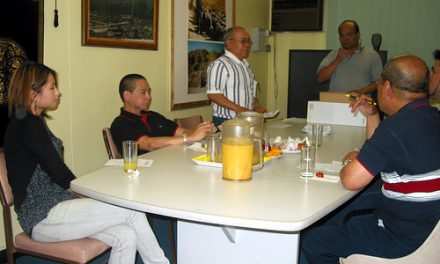In the post “An Imagined Future of Altona“, I suggested the establishment of a Biotechnology Industry in Altona. I did not realize that there is already one biotechnology company that has made it big on the international scene. Plantic Technologies, a world-leading innovator in bioplastics, is based in Altona where its headquarter, R & D and manufacturing facilities are located. The company also has sales offices in Germany, U.K. and the U.S., employing about 50 people worldwide.
Plantic Technologies was founded in 2003, based on a technology developed from federally-funded research into plastics carried out at the Co-operative Research Centre for International Food Manufacture and Packaging Science, involving scientists from Swinburne University, University of Queensland and CSIRO.
Photo published in Sydney Morning Herald on 15 Nov 2010
Its cutting-edge bioplastic is called Plantic and is made from a renewable, abundant and economical organic source – starch derived from high-amylose, non-genetically-modified corn. It is 40% more cost-competitive than petrochemical-based plastics, while delivering the same performance, protection and presentation capabilities. The unique chemical properties of the amylose molecule enable Plantic to be customised in a variety of colours and thicknesses, to suit a wider range of applications than other bioplastics.
Being totally biodegradable, compostable and water-soluble, Plantic is very environmentally-friendly. It decomposes safely, effectively and completely after its useful shell life and does not remain in landfills. This is unlike petrochemically-derived plastics which take a long time to break down, thereby incurring significant waste management and environmental costs. Petrochemical raw materials are also non-renewable, potentially polluting and have fluctuating prices.
Plantic-based products are anti-static, sealable, printable, laser-etchable, safe and easy to work with. They provide an excellent gas, taint and odour barrier, and can be hybridized to conventional plastics for creating a potentially limitless range of uses.
Plantic material, produced as extruded sheets or resin granules, is sold worldwide for use across the complete spectrum of conventional plastics applications, including thermoforming, injection moulding, film extrusion, blow moulding, rigid and flexible packaging. From food and beverage packaging to medical, automotive and aerospace applications, there is virtually no industry that will not soon benefit from this new technology. One of Plantic Technology’s specialties is trays used in the packaging of foods like fine chocolates, which help to keep the food dry, provide protective cushion and separate food pieces from each other.
Plantic appeals to environmentally-conscious consumers who want to reduce plastic wastes. Major multinational corporations have been quick to adopt this bioresponsible technology. Plantic customers include significant Australian and international users of packaging such as Marks & Spencer, Nestlé, Sainsbury’s and Cadbury Schweppes while Plantic material is distributed even more widely to other industries around the world via global leaders such as DuPont Packaging, Industrial Polymers, Visy Industries and Klockner Pentaplast.
Leading British retailer Marks & Spencer has announced that it will sell its entire Swiss chocolate range this Christmas in Plantic plastic trays. Chocolate lovers will now have no guilt of what do with the leftover trays – they can just throw the trays on their compost heap and they will be turned into natural fertilizers in no time!
Reference Source





Thanks Anthony for your blog. It is very informative and you are very resourcful.